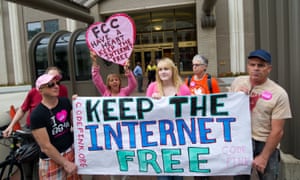
Like many Americans, I don’t have a choice about my internet service provider. I live in a subsidized housing development where there’s only one option, and it happens to be, by some accounts, the most hated company in the United States.
Like its monstrous peers, my provider is celebrating that Congress has recently permitted it to spy on me. Although it pretends to support the overwhelming majority of the country’s population who support net neutrality, it has been trying to bury the principle of an open internet for years and, under Trump’s Federal Communications Commission, is making good progress.
I can already feel my browsing habits shift. I’m reigning in curiosities a bit more, a bit more anxious about who might be watching. I’ve taken to using a VPN, like people have to do to access the open internet from China. And the real effects go deeper than personal anxieties.
Although the fight for an open internet tends to have Silicon Valley tech bros at the forefront, it’s a racial justice issue; arbitrary powers for corporations tend not to help marginalized populations. It’s a rural justice issue, too.
The big service providers pushing the deregulation spree are the same companies that have so far refused to bring broadband to less-dense areas. They are holding under-served communities hostage by proposing a deal: roll back rights to private, open media, and we’ll give you cheaper internet. Trump’s Republican party is taking the bait.
This is not a deal we need to make. It shouldn’t be necessary to choose between universal access and basic rights. But this deal has been a long time coming, thanks to long campaigns to convince us there is no other way. It turns out, though, there is.
Up in the mountains west of me, a decade and a half ago, the commercial internet service providers weren’t bringing high-speed connectivity to residents, so a group of neighbors banded together and created their own internet cooperative. Big providers love making their jobs sound so complicated that nobody else could do it, but these people set up their own wireless network, and they still maintain it.
Of course, their service remains pretty rudimentary; the same can’t be said of Longmont, Colorado, a city 20 minutes from where I live in the opposite direction. There, the city-owned NextLight fiber network provides some of the fastest connectivity in the country for a reasonable price. In Longmont, all the surveillance and anti-neutrality stuff simply isn’t relevant.
“As a not-for-profit community-owned broadband provider, our loyalty is entirely to our customer-owners,” a spokesman recently told the local paper. “That will not change, regardless of what happens to the FCC regulations in question.”
Municipalities across the country, from Santa Monica to Chattanooga, have quietly created their own internet service providers – and for the most part residents love them, especially in comparison to the competition.
A major reason more towns haven’t followed suit is that the big telecoms companies have lobbied hard to discourage or outright ban community broadband, pressuring many states to enact legal barriers. It’s happening again in West Virginia. But the tide may be turning.
Consumer Reports has taken up a crusade against these restrictions. Colorado has one on the books, but jurisdictions can opt out by referendum. Following Longmont’s example, in the 2016 election, the citizens of 26 cities and countiesin the state opened the door to building internet service providers of their own.
Local government isn’t the only path for creating internet service accountable to its users. On the far western end of the state, an old energy cooperative called Delta Montrose Electric Association has created a new offering for its member-owners, Elevate Fiber. It delivers a remarkable 100 megabits per second – upload and download – to homes for $50 a month.
Electric co-ops once brought power to rural areas to people that investor-owned companies wouldn’t serve, and now they’re starting to do the same with broadband. The Obama-era FCC supported these efforts. Donald Trump has voiced support for rural broadband in general, but it remains to be seen whether that will mean subsidies for big corporations, whose existing customers despise them, or opportunities for communities to take control of the internet for themselves.
Whatever happens in Washington, we can start building an internet that respects our rights on the local level. What would be the best route for creating community broadband in your community?
In cities and towns, it’s probably through a municipal government, or even neighborhood mesh networks, which can swell across whole regions. Rural areas can piggyback on existing electric and telephone cooperatives, or start new co-ops from scratch.
The Institute for Local Self-Reliance is one of the best organizations tracking these options, and its Community Networks website is full of resources about who is doing what where, and why.
It turns out that many community-based internet providers actually oppose the form net neutrality has come to take. There are troubling reasons the idea is so vigorously supported by internet giants like Facebook and Google, who also have surveillance addictions of their own.
There is a genuine debate to be had. Entrapment by unpopular, unaccountable corporations doesn’t constitute one. Those of us who rely on regulations to protect us from our providers can’t afford to budge on letting those regulations go. But when our points of access are accountable to us, the debate about the future of the internet can get a lot more interesting.
- This article was amended on 26 July 2017. A previous version incorrectly stated that a majority of Americans oppose net neutrality; in fact a majority supports it.
[Source:-theguardian]
